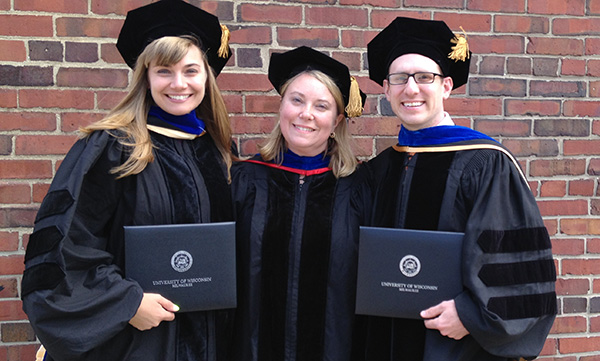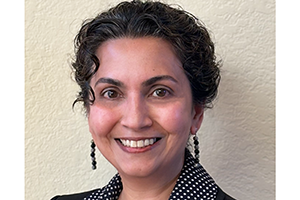
Devrah Arndt came to Milwaukee armed with a bachelor’s degree in biology from UW-Madison and took a job as a lab technician at UWM’s School of Freshwater Sciences (SFS). The job turned into a career path that culminated this month with her doctoral degree.
For Benjamin Blair, the road leading to SFS and a PhD in water policy began with bachelor’s and master’s degrees in business from UW-Whitewater. He then moved to Milwaukee, lured by the city’s rising profile as a hub of water research and technology.
Arndt and Blair have become the first PhD graduates of UWM’s unique graduate school, and were among 160 doctoral degrees awarded at commencement on May 18.
Devrah Arndt
Arndt was introduced to the field of toxicology while working in the lab of Associate Professor Rebecca Klaper, an expert in the effects of emerging contaminants in freshwater systems, like the Great Lakes. One of Arndt’s primary projects involved exposing fish cells to carbon nanomaterials – atomic-scale particles used to give commercial products various properties, such as dirt-resistance, strength or sun-blocking.
These particles are too small to be visible or to be removed by wastewater treatment processes and they end up into the water supply, where they may affect the health of people or aquatic life.
Arndt describes the work as both “interesting and exhilarating,” and so, when she got the chance to get her graduate training on human and ecosystem health with Klaper, she jumped at it.
“I knew I always wanted to work in water,” said Arndt, who is now working as a postdoctoral scholar at the University of Kentucky in Lexington. “The school has a perfect location on Lake Michigan, and it also had some of the top freshwater researchers in the nation as part of its academic program. I feel very lucky to have gotten my PhD from this program.”
In 2011, she won a prestigious grant from the Charles A. and Anne Morrow Lindbergh Foundation, which funded her research for an entire summer.
“Another highlight of my doctoral journey,” she said, “was attending local and national conferences, which provided me access to the professional science community and allowed me to realize the importance of my research.”
Benjamin Blair
Waupaca native Benjamin Blair arrived in Milwaukee looking for a way to apply his business degrees. So he took a few environmental engineering courses, including one in wastewater treatment, at the Milwaukee School of Engineering (MSOE).
“Through the courses I was taking at MSOE, I saw as a tremendous fit for someone with a background in finance to work in freshwater,” he said.
He wasn’t aiming at a career as an accountant – or as an engineer. But by following his interests he homed in on the policy and management track at SFS.
“I wanted a very interdisciplinary degree for a very interdisciplinary job,” he said. “This bridged the gap for me between environmental science and policy.”
Blair also worked with Klaper, but his focus was on the management implications of pharmaceutical and personal-care products in wastewater. His graduate school high point occurred at a non-academic conference in Denver.
“It was an event for pharmacists focused on pharmaceuticals in water supplies,” he said. “I just showed up because I was interested in the topic. And at one session, the speakers called attention to a published paper on pharmaceuticals found in Lake Michigan. It was a paper I had written.”
The incident took him completely by surprise. “To have a paper you wrote discussed by others at a national conference felt pretty good,” he said. “People must be reading it.”
Blair is currently at the University of Colorado Denver, where he teaches and conducts research on the policy and management of the hydrology of fracking.



